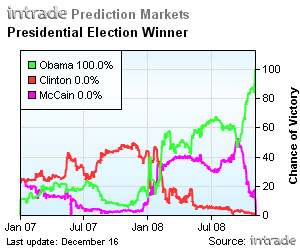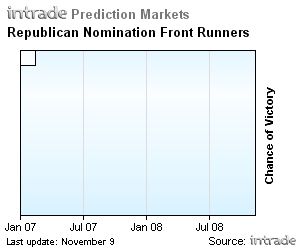
1. It really was an upset – As it has been pointed out elsewhere, the Clinton victory was a surprise to everyone. Favorites can lose. But so what? Ordinarily, that’s not a market flaw or a reason to doubt the odds shown in the market.
Justin Wolfers article in the WSJ had the best summary:
Against this background, it is no exaggeration to term the result truly historic. Not that there haven’-t been more dramatic upsets or come-from-behind wins that carried more significance —- this was just an early primary, albeit a pivotal one. But in terms of unpredictability, or at least the failure of everyone to predict it, it may have no modern match.
…
Historical comparisons are already being drawn between the New Hampshire primary and the famous 1948 presidential race…Yet the magnitude of the Clinton surprise is arguably even greater…-Thus, Sen. Clinton’-s victory on Tuesday was more surprising than President Truman’-s in 1948.
Given the above, were the Clinton prices on Intrade very far off? It’-s not obvious that they were.
2. Pundits/Critics are NOT traders – If I believe a contract should be trading around 30 and I see it trading at 7, it would make my day. As a trader, seeing a contract that is clearly mispriced is a good thing. Traders who remember the French politician Le Pen’s strong showing in 2002 vs his polls or who read Steve Sailer’s blog should not be surprised that people are dishonest with pollsters. However, to a pundit, an isolated incident of mispricing means the entire concept of prediction markets is faulty.
Since NH results, pundits have been asking, “Are prediction markets flawed?” The traders who make and move the market don’t believe so- they are trading more than ever. In any case, there were no postings on the 7th of January about how wrong the prediction markets are, only after-the-fact postings demonstrating perfect 20/20 hindsight. Traders, not critics, will determine the success of the prediction markets.
Let us not forget that pundits have an agenda too. For some, especially political ones, they need to present themselves as being able to offer insight that no one else has. Since prediction markets allow events to be quantified in real time, the pundits have less to add. This makes critics especially eager to take some of the shine off prediction markets and make themselves look smarter by comparison.
Additionally, there is a contingent of commentators and bloggers with an anti-market bias who delight in seeing any market based tool be wrong. They will be the first to loudly smear PM errors but no where to be found when the market turns out to be right.
3. PMs are not polls – This common mistake is exemplified by this quote from the Chicago Tribune, “The New Hampshire primary was a reminder that prediction markets, where bettors are putting money on the line, can have no more value than opinion polls, where participation costs nothing.” This critic missed the point and doesn’-t realize he is comparing apples and oranges.
Most commentators have focused on the accuracy of the market prices without touching on the underlying purpose of the market: speculation and hedging. Even if the polls are no more accurate than the market, they still can’t be used for trading functions.
4. Regulations have hurt the accuracy and liquidity of PMs – The inconvenience of opening a trading account at Intrade has excluded many Americans from participating. What is the cost of accuracy to the PMs? Surowiecki’s The Wisdom of Crowds lists four factors necessary for a wise crowd: diversity of opinion, independence, decentralization, and aggregation. At least two of these have been highly restricted due to regulations. Even so, the market is usually more accurate than the polls. None of the critics has pointed out that with so many potential traders cut off from trading, the market is surely excluding informed participants.
5. “Serious people who study or work with these markets are not in the ‘-markets are magic’- camp” – Prediction markets are like other financial markets: fat tails, black swans, bubbles, “manipulations” etc. These are all visible in housing, equities, and fixed income markets as well and no one speculates about the end of those instruments. As Eric Zitzewitz pointed out, the “markets are magic” crowd is just a strawman and not a logical basis to attack prediction markets.
Digg Link:
http://digg.com/business_finance/Top_Five_Reasons…-
![]()













































